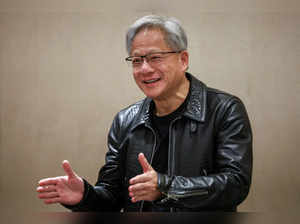 Reuters
ReutersMajor players in the sector felt the brunt of the selloff. IonQ's stock plummeted by more than 40%, Rigetti Computing saw a staggering 45% drop, and D-Wave's shares tumbled 36%. Despite the dip, D-Wave’s stock remains up around 600% over the past year, showcasing its previous meteoric rise.
Huang made the controversial comments during Nvidia's analyst day at CES, where he projected that achieving "very useful quantum computers" could take between 15 and 30 years. He explained that this delay stems from the need for quantum computers to scale up their quantum processing units (qubits) by a factor of 1 million to become truly impactful.
"Dead Wrong"
D-Wave Quantum CEO Alan Baratz vehemently disagreed, declaring Huang’s assessment as “dead wrong.” Speaking to CNBC, Baratz countered, "The reason he's wrong is that we at D-Wave are commercial today." He pointed to prominent clients such as Mastercard and NTT Docomo that are already leveraging D-Wave's quantum computers for real-world business operations.
Baratz conceded that Huang's comments might apply to gate model quantum computers but argued they were "100% off base for annealing quantum computers," which is the foundation of D-Wave’s technology. In a bold move, Baratz invited Huang to meet “any time, any place” to discuss the distinctions and fill what he termed as gaps in Huang’s understanding.
The selloff also came amid a period of heightened interest in quantum computing. In December, Google announced a breakthrough with its Willow quantum chip, achieving a 100-qubit chip. This milestone represents the second step in Google's six-part strategy to develop a quantum system with 1 million qubits.
Prior to the selloff, quantum computing stocks had been soaring. D-Wave’s shares surged 178% in December, following a 185% rise in November. Despite the recent turbulence, the sector continues to generate excitement, with industry leaders pushing back against skeptics and advancing their technologies at an accelerated pace.
Read More News on
(Catch all the Business News, Breaking News, Budget 2024 Events and Latest News Updates on The Economic Times.)
Subscribe to The Economic Times Prime and read the ET ePaper online.
Read More News on
(Catch all the Business News, Breaking News, Budget 2024 Events and Latest News Updates on The Economic Times.)
Subscribe to The Economic Times Prime and read the ET ePaper online.









































 Get Unlimited Access to The Economic Times
Get Unlimited Access to The Economic Times
